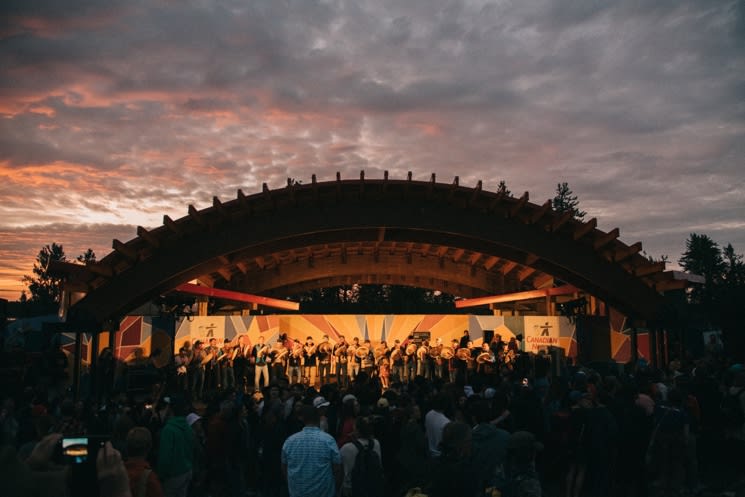It's only been a year since Munya Mataruse moved to Yellowknife, and he's already received one of the highest honours given to a local musician: playing the Main Stage at Folk on the Rocks, the biggest music festival in the Northwest Territories.
The hundreds of adoring, engaged audience members were a bonus.
The Zimbabwe-born folk musician first visited Canada touring with the legendary Oliver Mtukudzi, which led to a move to Edmonton in 2015 to study music production. During the pandemic, he got wind of Yellowknife's above-average salaries, a fact that was repeated to me by every local I met over my five days in the city. And so, the musician, sound engineer and videographer moved to Yellowknife, population approximately 20,000.
"I started really slow, performing for a few people," recalls Mataruse when I catch him backstage, minutes after the end of his performance at Folk on the Rocks 2022, which ran from July 15 to 17. "I remember, last summer, I was invited by a friend to a campsite. Those were some of my best performances. It was during COVID, so I wasn't allowed to do a big event. I was just performing it for five, six people in that campsite. And everybody there ended up supporting me."
Over the course of several months, Mataruse's local reputation snowballed, culminating in his set at Folk on the Rocks's Main Stage Showdown in June, a talent show that awarded the winner a spot on the festival's biggest platform. Mataruse ran with the opportunity: his Main Stage set found him stretching out his kwela folk tracks into tutorials, testing the audience's rhythmic, vocal and dancing abilities (and lovingly goading them along) while jamming out on his guitar. He took things up a notch during mid-set highlight "Wheropa," when the set became a full-blown dance workshop. The beachy backing track looped for minutes on end as Mataruse taught a variety of shangara moves to the eager crowd.
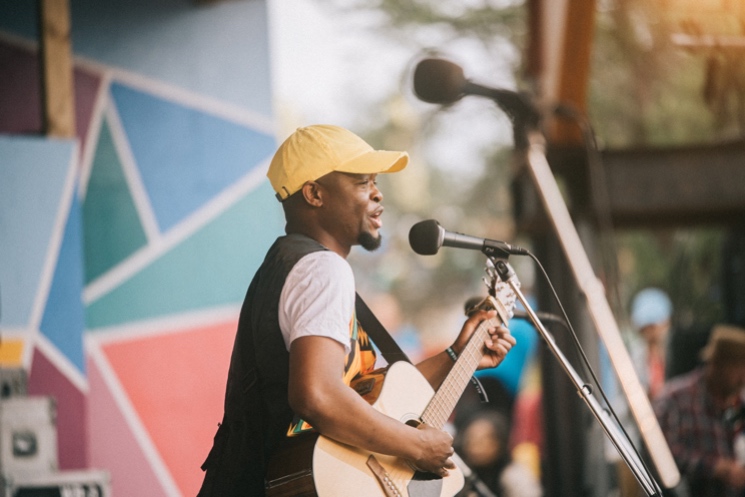 Munya Mataruse
Munya Mataruse
A music festival with "folk" in the name might be a pretty good place to enjoy a participation-heavy, pretension-free set like Mataruse's — if you're reading this, chances are you've witnessed something similar elsewhere. But there's something unique to the environment of Folk on the Rocks, which has set up on the shores of Long Lake every summer since 1980 (except for 2020, for obvious reasons). As I explored the city and the festival, my first time north of the 60th parallel, I felt a gently buzzing air of excitement at all times, even during the informal open mic at the the Kilt & Castle Pub the Thursday night before the festival, and during a brief spell of heavy rain on the Saturday afternoon when we all huddled together under covered areas or donned garbage bags as impromptu raincoats.
What is it that makes Folk on the Rocks so special? Maybe it's the typically clear and bright weather (freak rainstorm notwithstanding), particularly the much-touted "midnight sun," which keeps light on the horizon into the early hours of the next day, maintaining festivalgoers' alertness and decreasing fatigue in the absence of your body's usual signals to begin shutting down at night. That sentiment was echoed by the fest's Stage Team Manager, born-and-raised Yellowknifer Shiri MacPherson, who has attended every edition since she was born 21 years ago (her dad, Marino Casebeer, has volunteered for the fest since its early years). She tells me, adorned in her custom "Backstage Goddess" hat, "We're a winter city. Yellowknife is cold all the time, so I think this is our hurrah in the summer, and then we wrap up for the winter."
It could be a byproduct of its environment. Yellowknife isn't completely isolated, but it's still harder to reach than most Canadian cities — from Edmonton, the nearest city over, it's a 15-hour drive or 90-minute flight. A large amount of residents, I'm told, either work for the government or the mines, further condensing the city's social framework. As Joel Plaskett, who made his second headlining appearance at the fest, tells me, "I love the sense of community here. I could feel it last time. I grew up in a small town, so it just really resonated with me. There's a connection to the East Coast here. There's actually quite a few people from the East Coast — not that that would be the reason that you're drawn here — but I felt welcomed, I guess, and it felt familiar, despite the change of geography."
Perhaps, as Plaskett and MacPherson suggest to me separately, it's the grounds. Folk on the Rocks takes place on the shores of Long Lake, a vast expanse of trees, grass and sand a quick drive away from the city. You're even free to swim in the lake, though at your own risk (there are no lifeguards). Says MacPherson, "Our site is so unique. We're on a huge sandy hill overlooking this gorgeous lake. I think there's just so many aspects of it that just really make it that much more special."
Adds Plaskett, "It's this setting with the sand by the beach that's a little unusual. It's not so dissimilar from places I've been in, say, Northern Ontario. The trees are a bit different, there are amazing dragonflies here, you notice that?" (I actually had — the day before, I saw two massive dragonflies that appeared to be getting it on. My trip to Yellowknife already stands alone in my life experiences, if only for talking about dragonfly sex with Joel Plaskett.)
Plaskett has been touring for decades, having started as a teenager with Thrush Hermit before starting his storied solo career. He's played many festivals, and been to the North several times, including Iqaluit, Igloolik and Dawson City. But he hasn't written songs about all of them like he did about his first trip to Yellowknife for Folk on the Rocks 2016, which he immortalized in "The New California" from Solidarity, his 2017 collab album with his dad, Bill. ("If I could come here with Dad, he would love that," says Joel.)
When Plaskett dropped that track during his (almost) fest-closing, headlining set hours later, it elicited a reaction bigger than hits like "Nowhere with You" and "Through & Through & Through": "Hug your boy and kiss your wife / Pack a bag for Yellowknife / It's the new California in July / The sun won't leave the sky." The applause crested with Plaskett's shoutout to local restaurant, hotel and venue Gold Range, where he had been partying the night before, and their house band Ernie and the Boys.
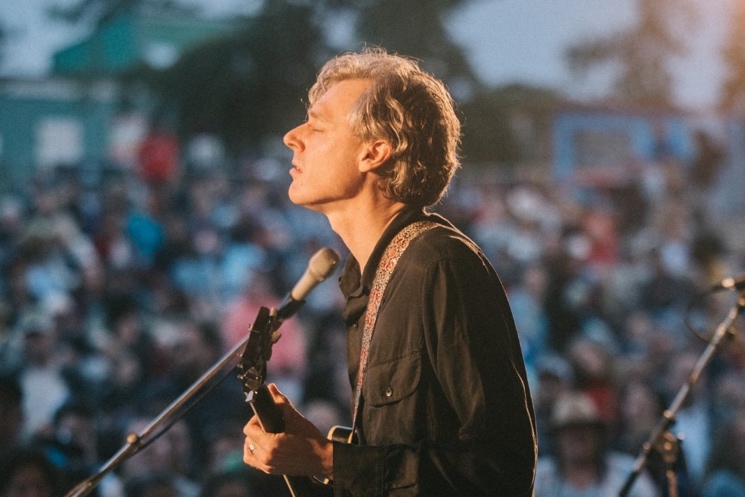 Joel Plaskett
Joel Plaskett
And this takes us back to community, and the festival's vital, almost life-giving acceptance of anyone willing to make the trip. Dancing in the rain to the Inuktitut-language folk punk of "echoes" (an offshoot of the Jerry Cans), cheering on the burlesque performers at the annual Glam on the Rocks showcase, or following Mataruse's instructions, it was an environment without fear of judgement, where lining up for food or drink meant likely making a new friend.
Says MacPherson, "A lot of people [have] mentioned, and from what I've experienced here, as well, is there's a huge sense of community at Folk. And that's really noticeable, especially when you're coming in from outside. We welcome everyone with open arms. We have amazing hospitality for our artists with amazing food from amazing local vendors."
Mataruse, who received an uproarious welcome and shoutouts from the crowd as if everyone had known him for decades, says, "Everyone knows that if you go to Folk on the Rocks, you're gonna be happy, you're gonna enjoy [yourself]. So to me, as an artist, I really love this festival. They've done so much work in previous years. Now, these are just the fruits of what they've seeded before. It's a dream for everyone to play at festivals like this one."
Remarks Plaskett, "Lots of festivals are long-running, have a big sense of community, so it's not just community, because every community is different. Maybe there is something here that's a really interesting mix of people. I feel like you get a sense of the local community. There's a strong Indigenous presence, which is really nice."
Plaskett's performance was followed by the true fest-ender, the Yellowknives Dene Drummers, who open and close every festival and welcome the majority-settler crowd onto the land. As the two-dozen percussionists sung and drummed, the crowd erupted into a frenzy. And then, a new friend tapped me on the shoulder and I followed him up the hill to join the massive line, which circled the Main Stage grounds and eventually met itself, forming an ecstatic Ouroboros. Midnight approaches, and the sun still shines. "I wanna see a trench from dancing," one of the Drummers says into the mic. "We're gonna get going until it gets really dark. So, probably August."
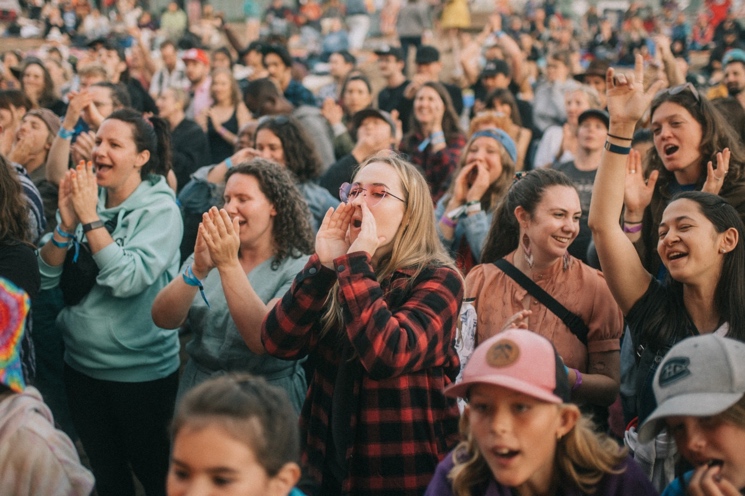
Here are four more standout performances from Folk on the Rocks 2022.
Gnarwhal
Folk on the Rocks' longstanding opening tradition is Warm the Rocks, a two-part event on the Friday night before the festival hits full stride the following day, typically a free afternoon show in the city and a night of performances on the festival grounds, mostly preview sets from performers who will be playing again on the weekend. It's useful because it can preemptively resolve scheduling conflicts, spread the gospel thanks to some new devotees, and, in the case of local hard rockers Gnarwhal, let them get used to the environment so they could take it up a notch two days later, on the festival's closing day.
It's as if they had practised for a lifetime in the almost exactly 48 hours between their Beer Garden appearances, even though they had spent most of those hours hanging out at the fest like everyone else. The songs were the same — like riff-heavy new single "Deep Spaced" and a cover of Nirvana's "Breed" that showed off tight, melodic three-part harmonies — but heightened the second time around by several rows of screaming fans. Whether they were friends and family members from town or converts from the Friday night performance, they were all the quartet needed to take it up a notch, culminating in their scorching cover of Royal Blood's "Figure It Out," when guitarist Benji Straker poured a beer down the throat (but mostly the shirt) of vocalist Mark Kilbride.
Leaf Rapids
The Winnipeg folk-rock quartet were founded by married couple Keri and Devin Latimer, respectively the band's vocalist-guitarist and bassist, but it was the interplay between Keri and drummer Joanna Miller that really drove the action of Leaf Rapids' Saturday afternoon performance on the Lakefront Stage. Their simply structured songs were augmented by solid playing — with a rock 'n' roll twang reminiscent of the Band emphasized by lead guitarist Chris Dunn — and fleshed out by Keri and Miller's detail-rich interplay, including Keri's theremin, Miller's whistling and the pair's vocal harmonies.
It all gave the set a crisp, full-bodied studio feel, with layers that were so clean and polished that they sounded more like overdubs, which intensified songs like "Dear Sister," about a friend who was shamed by her religious community for her teenage pregnancy. The theremin wasn't the only ghostly wail heard throughout the set: sharp peals of feedback persisted throughout the set that Leaf Rapids dealt with affably, culminating in a charming improvised ditty about throwing the bassist's fritzing monitor into the lake that flowed gently behind them.
The Trade-Offs
The moment he walked onto the Beer Garden Stage on Saturday evening, decked out in all black (including wide-brimmed hat) except for translucent green glasses, it was obvious that Joshua Qaumariaq is a star. And when he started singing, it was clear that he is a superstar. The vocalist of Iqaluit-based rockers the Trade-Offs just has one of those voices: big, bellowing and bluesy, like Nick Cave with a little more rasp and Randy Newman with a little more edge. Though co-leader Jeff Maurice was unable to be there, the backing band — guitarist Jaqqa J. Petersen, bassist Brendan "Dotes" Doherty, pedal steel guitarist Michael Eckert and drummer Galen Pelley — were more than enough to support Qaumariaq's virtuosic talent.
As the show kept going, Qaumariaq kept revealing new layers to his artistry: raw and real lyrics that address issues on micro and macro levels ("Drinking wine, then whiskey / They won't fix them, these problems of mine" on "Red," "Don't nobody know my troubles with God" on "Trouble So Hard"), dextrous guitar shredding, audience participation, and even a breathtaking high register. During their late-set cover of Gary Clark Jr.'s "Bright Lights," Qaumariaq sang, "You're gonna know my name by the end of the night," and even though the nights don't really end in Yellowknife these days, I suspect his name made his way around the grounds remarkably fast anyway. (I missed the band's encore performance on the Lakefront Stage the next day because I was conducting interviews elsewhere on the grounds, but Qaumariaq's voice is all over my recordings, and it sounded great.)
Haviah Mighty
Toronto rapper Haviah Mighty wasn't able to take a well-deserved victory lap after winning the Polaris Music Prize in September 2019, but for her first full festival season since her big win, she proved that she stepped up her live game in the interim, somehow, when she headlined the Main Stage on Saturday night. She's still keeping to the usual setup of her and DJ Dem Ones, but now that she's playing main stages, she has a live show to match: her rapping, singing and dancing were all top-notch and effortless, with AutoTune and fluid movements nicely complementing her rhymes. A new track showed off some levelled-up production skills too.
But nothing shone more than her crowd work — it seemed like all of the hundreds of audience members (many of whom, I'm sure, had been waiting since her initial performance was announced for 2020) were losing it throughout the show, but no one could compare to a few lines of teens at the front of the stage, who absolutely lost their shit every time the rapper came by for another round of high fives. During poignant closer "Protest," she took a fan's phone from the front row to film a video they'll surely never delete.
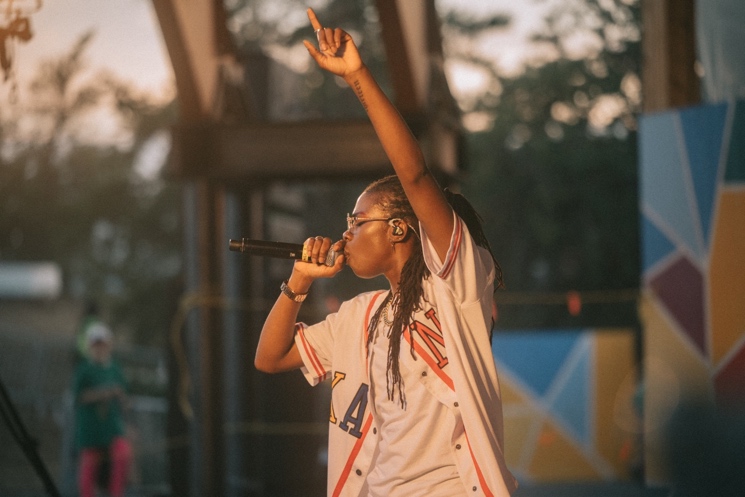 Haviah Mighty
Haviah Mighty
We acknowledge the support of the Canada Council for the Arts.

The hundreds of adoring, engaged audience members were a bonus.
The Zimbabwe-born folk musician first visited Canada touring with the legendary Oliver Mtukudzi, which led to a move to Edmonton in 2015 to study music production. During the pandemic, he got wind of Yellowknife's above-average salaries, a fact that was repeated to me by every local I met over my five days in the city. And so, the musician, sound engineer and videographer moved to Yellowknife, population approximately 20,000.
"I started really slow, performing for a few people," recalls Mataruse when I catch him backstage, minutes after the end of his performance at Folk on the Rocks 2022, which ran from July 15 to 17. "I remember, last summer, I was invited by a friend to a campsite. Those were some of my best performances. It was during COVID, so I wasn't allowed to do a big event. I was just performing it for five, six people in that campsite. And everybody there ended up supporting me."
Over the course of several months, Mataruse's local reputation snowballed, culminating in his set at Folk on the Rocks's Main Stage Showdown in June, a talent show that awarded the winner a spot on the festival's biggest platform. Mataruse ran with the opportunity: his Main Stage set found him stretching out his kwela folk tracks into tutorials, testing the audience's rhythmic, vocal and dancing abilities (and lovingly goading them along) while jamming out on his guitar. He took things up a notch during mid-set highlight "Wheropa," when the set became a full-blown dance workshop. The beachy backing track looped for minutes on end as Mataruse taught a variety of shangara moves to the eager crowd.
 Munya Mataruse
Munya MataruseA music festival with "folk" in the name might be a pretty good place to enjoy a participation-heavy, pretension-free set like Mataruse's — if you're reading this, chances are you've witnessed something similar elsewhere. But there's something unique to the environment of Folk on the Rocks, which has set up on the shores of Long Lake every summer since 1980 (except for 2020, for obvious reasons). As I explored the city and the festival, my first time north of the 60th parallel, I felt a gently buzzing air of excitement at all times, even during the informal open mic at the the Kilt & Castle Pub the Thursday night before the festival, and during a brief spell of heavy rain on the Saturday afternoon when we all huddled together under covered areas or donned garbage bags as impromptu raincoats.
What is it that makes Folk on the Rocks so special? Maybe it's the typically clear and bright weather (freak rainstorm notwithstanding), particularly the much-touted "midnight sun," which keeps light on the horizon into the early hours of the next day, maintaining festivalgoers' alertness and decreasing fatigue in the absence of your body's usual signals to begin shutting down at night. That sentiment was echoed by the fest's Stage Team Manager, born-and-raised Yellowknifer Shiri MacPherson, who has attended every edition since she was born 21 years ago (her dad, Marino Casebeer, has volunteered for the fest since its early years). She tells me, adorned in her custom "Backstage Goddess" hat, "We're a winter city. Yellowknife is cold all the time, so I think this is our hurrah in the summer, and then we wrap up for the winter."
It could be a byproduct of its environment. Yellowknife isn't completely isolated, but it's still harder to reach than most Canadian cities — from Edmonton, the nearest city over, it's a 15-hour drive or 90-minute flight. A large amount of residents, I'm told, either work for the government or the mines, further condensing the city's social framework. As Joel Plaskett, who made his second headlining appearance at the fest, tells me, "I love the sense of community here. I could feel it last time. I grew up in a small town, so it just really resonated with me. There's a connection to the East Coast here. There's actually quite a few people from the East Coast — not that that would be the reason that you're drawn here — but I felt welcomed, I guess, and it felt familiar, despite the change of geography."
Perhaps, as Plaskett and MacPherson suggest to me separately, it's the grounds. Folk on the Rocks takes place on the shores of Long Lake, a vast expanse of trees, grass and sand a quick drive away from the city. You're even free to swim in the lake, though at your own risk (there are no lifeguards). Says MacPherson, "Our site is so unique. We're on a huge sandy hill overlooking this gorgeous lake. I think there's just so many aspects of it that just really make it that much more special."
Adds Plaskett, "It's this setting with the sand by the beach that's a little unusual. It's not so dissimilar from places I've been in, say, Northern Ontario. The trees are a bit different, there are amazing dragonflies here, you notice that?" (I actually had — the day before, I saw two massive dragonflies that appeared to be getting it on. My trip to Yellowknife already stands alone in my life experiences, if only for talking about dragonfly sex with Joel Plaskett.)
Plaskett has been touring for decades, having started as a teenager with Thrush Hermit before starting his storied solo career. He's played many festivals, and been to the North several times, including Iqaluit, Igloolik and Dawson City. But he hasn't written songs about all of them like he did about his first trip to Yellowknife for Folk on the Rocks 2016, which he immortalized in "The New California" from Solidarity, his 2017 collab album with his dad, Bill. ("If I could come here with Dad, he would love that," says Joel.)
When Plaskett dropped that track during his (almost) fest-closing, headlining set hours later, it elicited a reaction bigger than hits like "Nowhere with You" and "Through & Through & Through": "Hug your boy and kiss your wife / Pack a bag for Yellowknife / It's the new California in July / The sun won't leave the sky." The applause crested with Plaskett's shoutout to local restaurant, hotel and venue Gold Range, where he had been partying the night before, and their house band Ernie and the Boys.
 Joel Plaskett
Joel PlaskettAnd this takes us back to community, and the festival's vital, almost life-giving acceptance of anyone willing to make the trip. Dancing in the rain to the Inuktitut-language folk punk of "echoes" (an offshoot of the Jerry Cans), cheering on the burlesque performers at the annual Glam on the Rocks showcase, or following Mataruse's instructions, it was an environment without fear of judgement, where lining up for food or drink meant likely making a new friend.
Says MacPherson, "A lot of people [have] mentioned, and from what I've experienced here, as well, is there's a huge sense of community at Folk. And that's really noticeable, especially when you're coming in from outside. We welcome everyone with open arms. We have amazing hospitality for our artists with amazing food from amazing local vendors."
Mataruse, who received an uproarious welcome and shoutouts from the crowd as if everyone had known him for decades, says, "Everyone knows that if you go to Folk on the Rocks, you're gonna be happy, you're gonna enjoy [yourself]. So to me, as an artist, I really love this festival. They've done so much work in previous years. Now, these are just the fruits of what they've seeded before. It's a dream for everyone to play at festivals like this one."
Remarks Plaskett, "Lots of festivals are long-running, have a big sense of community, so it's not just community, because every community is different. Maybe there is something here that's a really interesting mix of people. I feel like you get a sense of the local community. There's a strong Indigenous presence, which is really nice."
Plaskett's performance was followed by the true fest-ender, the Yellowknives Dene Drummers, who open and close every festival and welcome the majority-settler crowd onto the land. As the two-dozen percussionists sung and drummed, the crowd erupted into a frenzy. And then, a new friend tapped me on the shoulder and I followed him up the hill to join the massive line, which circled the Main Stage grounds and eventually met itself, forming an ecstatic Ouroboros. Midnight approaches, and the sun still shines. "I wanna see a trench from dancing," one of the Drummers says into the mic. "We're gonna get going until it gets really dark. So, probably August."

Here are four more standout performances from Folk on the Rocks 2022.
Gnarwhal
Folk on the Rocks' longstanding opening tradition is Warm the Rocks, a two-part event on the Friday night before the festival hits full stride the following day, typically a free afternoon show in the city and a night of performances on the festival grounds, mostly preview sets from performers who will be playing again on the weekend. It's useful because it can preemptively resolve scheduling conflicts, spread the gospel thanks to some new devotees, and, in the case of local hard rockers Gnarwhal, let them get used to the environment so they could take it up a notch two days later, on the festival's closing day.
It's as if they had practised for a lifetime in the almost exactly 48 hours between their Beer Garden appearances, even though they had spent most of those hours hanging out at the fest like everyone else. The songs were the same — like riff-heavy new single "Deep Spaced" and a cover of Nirvana's "Breed" that showed off tight, melodic three-part harmonies — but heightened the second time around by several rows of screaming fans. Whether they were friends and family members from town or converts from the Friday night performance, they were all the quartet needed to take it up a notch, culminating in their scorching cover of Royal Blood's "Figure It Out," when guitarist Benji Straker poured a beer down the throat (but mostly the shirt) of vocalist Mark Kilbride.
Leaf Rapids
The Winnipeg folk-rock quartet were founded by married couple Keri and Devin Latimer, respectively the band's vocalist-guitarist and bassist, but it was the interplay between Keri and drummer Joanna Miller that really drove the action of Leaf Rapids' Saturday afternoon performance on the Lakefront Stage. Their simply structured songs were augmented by solid playing — with a rock 'n' roll twang reminiscent of the Band emphasized by lead guitarist Chris Dunn — and fleshed out by Keri and Miller's detail-rich interplay, including Keri's theremin, Miller's whistling and the pair's vocal harmonies.
It all gave the set a crisp, full-bodied studio feel, with layers that were so clean and polished that they sounded more like overdubs, which intensified songs like "Dear Sister," about a friend who was shamed by her religious community for her teenage pregnancy. The theremin wasn't the only ghostly wail heard throughout the set: sharp peals of feedback persisted throughout the set that Leaf Rapids dealt with affably, culminating in a charming improvised ditty about throwing the bassist's fritzing monitor into the lake that flowed gently behind them.
The Trade-Offs
The moment he walked onto the Beer Garden Stage on Saturday evening, decked out in all black (including wide-brimmed hat) except for translucent green glasses, it was obvious that Joshua Qaumariaq is a star. And when he started singing, it was clear that he is a superstar. The vocalist of Iqaluit-based rockers the Trade-Offs just has one of those voices: big, bellowing and bluesy, like Nick Cave with a little more rasp and Randy Newman with a little more edge. Though co-leader Jeff Maurice was unable to be there, the backing band — guitarist Jaqqa J. Petersen, bassist Brendan "Dotes" Doherty, pedal steel guitarist Michael Eckert and drummer Galen Pelley — were more than enough to support Qaumariaq's virtuosic talent.
As the show kept going, Qaumariaq kept revealing new layers to his artistry: raw and real lyrics that address issues on micro and macro levels ("Drinking wine, then whiskey / They won't fix them, these problems of mine" on "Red," "Don't nobody know my troubles with God" on "Trouble So Hard"), dextrous guitar shredding, audience participation, and even a breathtaking high register. During their late-set cover of Gary Clark Jr.'s "Bright Lights," Qaumariaq sang, "You're gonna know my name by the end of the night," and even though the nights don't really end in Yellowknife these days, I suspect his name made his way around the grounds remarkably fast anyway. (I missed the band's encore performance on the Lakefront Stage the next day because I was conducting interviews elsewhere on the grounds, but Qaumariaq's voice is all over my recordings, and it sounded great.)
Haviah Mighty
Toronto rapper Haviah Mighty wasn't able to take a well-deserved victory lap after winning the Polaris Music Prize in September 2019, but for her first full festival season since her big win, she proved that she stepped up her live game in the interim, somehow, when she headlined the Main Stage on Saturday night. She's still keeping to the usual setup of her and DJ Dem Ones, but now that she's playing main stages, she has a live show to match: her rapping, singing and dancing were all top-notch and effortless, with AutoTune and fluid movements nicely complementing her rhymes. A new track showed off some levelled-up production skills too.
But nothing shone more than her crowd work — it seemed like all of the hundreds of audience members (many of whom, I'm sure, had been waiting since her initial performance was announced for 2020) were losing it throughout the show, but no one could compare to a few lines of teens at the front of the stage, who absolutely lost their shit every time the rapper came by for another round of high fives. During poignant closer "Protest," she took a fan's phone from the front row to film a video they'll surely never delete.
 Haviah Mighty
Haviah MightyWe acknowledge the support of the Canada Council for the Arts.

